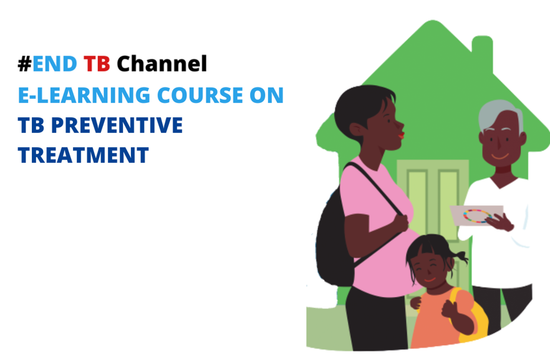
About a quarter of the world’s population is estimated to be infected with Mycobacterium tuberculosis bacilli, most of whom are not sick or infectious. Although they are well, people who are infected may develop TB disease in the future. Treating people infected with TB bacilli reduces the risk of TB infection progressing to active TB disease.
This e-learning course will provide the knowledge and skills necessary to support staff in countries in scaling-up targeted TB preventive treatment in their national TB strategy or supporting staff who seek guidance on implementation.
The main focus of this e-course is programmatic; clinical aspects are only discussed when relevant to specific topics.
Language: English
Advanced (Avancé), Tuberculosis
Course information
This course is also available in the following languages:
Overview: This e-learning course was developed by WHO. It is a comprehensive, self-paced online course that follows the content of the WHO operational handbook on tuberculosis. Module 1: Tuberculosis preventive treatment.
Duration: 4 to 5 hours
Certificate: Participants with an 80% score or more on the final assessment can download a Record of Achievement. Participants who receive a Record of Achievement can also download an Open Badge for this course. Click here to learn how.
© World Health Organization 2021. All rights reserved. This e-learning training was developed by the World Health Organization (WHO). It is intended to be used as a self-learning course on TB preventive treatment. All reasonable precautions have been taken by WHO to verify the information contained in this e-learning training. However, the e-learning training is being distributed without warranty of any kind, either expressed or implied. The responsibility for the interpretation and use of the e-learning training lies with the reader. In no event shall WHO be liable for damages arising from its use. The designations employed and the presentation of the material in this publication do not imply the expression of any opinion whatsoever on the part of WHO concerning the legal status of any country, territory, city or area or of its authorities, or concerning the delimitation of its frontiers or boundaries. Dotted and dashed lines on maps represent approximate border lines for which there may not yet be full agreement. The mention of specific companies or of certain manufacturers’ products does not imply that they are endorsed or recommended by the World Health Organization in preference to others of a similar nature that are not mentioned. Errors and omissions excepted, the names of proprietary products are distinguished by initial capital letters.
What you'll learn
- explain the elements of a system for implementing and scaling up TB preventive treatment, including the platforms and mechanisms necessary for policy development, decision-making and resource mobilization;
- describe the cascade of care for TB preventive treatment and the components of TB preventive treatment programmes necessary for identifying people at risk, offering appropriate regimens and supporting them in overcoming barriers to complete treatment;
- define the main indicators of the performance of TB preventive treatment and explain how to calculate and interpret them.
Who this course is for
- This e-learning course is intended for persons who provide guidance to countries on the uptake of WHO guidelines; for example, managers of national TB programmes, technical staff at ministries of health, WHO staff, staff of technical agencies, consultants and anyone supporting countries and major subnational units in the development and implementation of TB preventive treatment policies and guidelines. It is assumed that you have experience working on TB and are familiar with WHO TB guidelines.
Enroll me for this course
Certificate Requirements
- Gain a Record of Achievement by earning at least 80% of the maximum number of points from all graded assignments.
- Gain an Open Badge by completing the course.